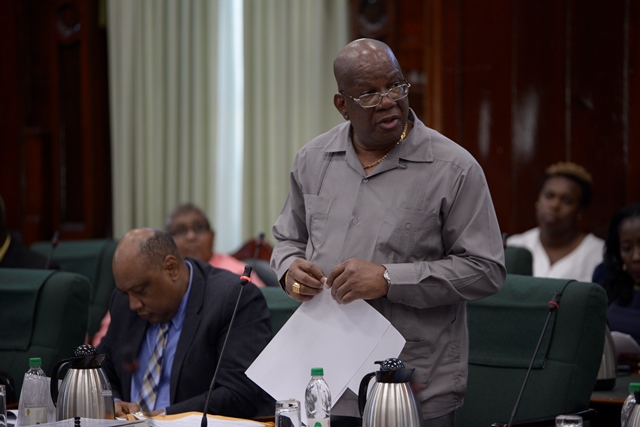The prevailing political climate arising from the outcome of last December’s no-confidence vote in the National Assembly could result in further downward revision of the originally envisaged 4.6% growth projection for 2019, according to the Mid-Year report released on Wednesday by the Ministry of Finance.
While in last yearend’s budget presentation Finance Minister Winston Jordan had announced a projected overall economic growth of 4.6% for the current year, actual half year growth outcomes resulted in a downward growth projection to 4.4%.
At a media briefing convened to provide the public with details of the Mid-Year report on Wednesday, Jordan disclosed that in the wake of the prevailing political climate, a further downward adjustment could be anticipated.
The tone as much as the content of the Minister’s presentation to the media pointed at the fact that government is pinning the blame for the fact that actual performance could fall short of its original projections on the political disruptions that have taken centre stage for all of 2019 so far.
The Mid-Year report alludes, euphemistically, to what it describes as “a number of downside risks, both locally and internationally,” then adds more directly that these include “…political uncertainty going into the impending General and Regional Elections,” which it said could impact even further on the attainment of the already revised growth rate.
However, mindful of the combative political climate that will almost certainly persist through to general elections which, from all indications, will be held this year, the Mid-Year report went to some trouble to make the point that the performance outcomes under the current political administration had reflected consecutive years of economic growth. “Between 2015 and 2019, every year, this economy grew,” Jordan told the media.
He revealed that Guyana’s economy grew by 4% in the first six months of 2019. According to the report, growth figures for the respective years were 3.2% (2015), 3.4% (2016), 2.1% (2017) and 4.1% (2018).
And seemingly not unmindful of an anticipated combative elections campaign likely to be directed on the opposition side by former president Bharrat Jagdeo, Jordan compared government’s 2015 to 2018 figures with those of 2001 to 2005, a period during which Jagdeo held office. He stated that the country’s economy grew 1.9% in 2001, 1.1% in 2002, -0.6% in 2003; 1.6% in 2004 and -5.5% in 2005.
Much of the credit for the economy’s growth performance during the first half of the year was given to the private sector, particularly in the area of gold production, which has been spearheading the country’s export earnings; rice, which has gradually been fighting back from exacting market challenges; and forestry, despite difficulties associated chiefly with transporting logs from far-flung interior locations over roads that are frequently impassable on account of a combination of weather-related challenges and less than reliable road repairs and maintenance regimes. The country’s manufacturing, construction, wholesale and retail trade and financial and insurance services are also credited in the half year report with contributing to growth.
The political underpinnings to what the report appears to see as an economic performance that is likely to fall below its own expectations are clear. In his own comments during the briefing, Jordan said that the challenging environment in which the APNU+AFC coalition administration had been functioning since 2015 had become more difficult since the December, 2018 no confidence vote against government, and, more recently, since last month’s Caribbean Court of Justice (CCJ) ruling on the validity of those proceedings.
Worryingly, Jordan also suggested that the failure so far of both the political opposition and the private sector to name representatives to the Natural Resources Fund, the body being created to manage incoming revenues from the country’s keenly anticipated hydrocarbon resources, could affect arrangements for access to and use of those revenues for critical developmental needs.






